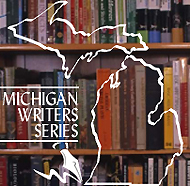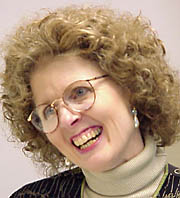 |

|
|
|
|
|
January
28 , 2000 |
|
| |
Novelist
Peter Levine |
|
| |
Born
and raised in Brooklyn, a graduate of Columbia and Rutgers,
Peter Levine has been teaching in the History department at
MSU since 1969, the year he left graduate school. Trained
originally as a Jacksonian political historian, Levine's scholarly
and writing interests have expanded to encompass the entire
19th century and beyond. His works engage in a wide range
of interelated themes and topics, including the immigrant
experience and assimilation, American Jewish history and culture,
and American popular culture.
Peter
Levine is best known for his work in sport and American social
history, especially for his books A.G. Spalding and the
Rise of Baseball, Idols of the Game with Robert Lipsyte,
and Ellis Island to Ebbets Field: Sport and the American
Jewish Experience. He is also known for his novel, The
Rabbi of Swat, which deals in a more personal way with
issues presented in his historical works.
The
Rabbi of Swat is a re-imagining of the baseball season
of 1927- the year Babe Ruth hit 60 home runs and led the Yankees
to the American League pennant. The hero of the novel, Morrie
Ginsberg, pitches for the New York Giants and struggles with
his team to win the National League pennant and face the Yankees
in the World Series. While the novel follows Ginsberg's exploits,
Babe Ruth is also a narrative voice, commenting on the action
and revealing his thoughts and emotions. The Rabbi of Swat
uses baseball as a template to reflect and explore the immigration
experience, religious prejudice, class issues, and the relationship
between fathers and sons. It is, in a sense, a coming-of-age
novel, as Morrie Ginsberg reconciles his father's expectations,
societal pressures, and his own desires to become a man in
the new American world.
"Baseball
has always been about fathers and sons, courage and love,
but no fiction has ever brought them all together with such
rich sentiment, hilarious history and an eye for the game.
Mazel tov. A home-run for Levine." Robert Lipsyte, sports
writer, New York Times.
Peter
Levine retired from MSU in 2000 and now lives in Brooklyn
where he continues to write. He also acts appearing in numerous
productions in New York and throughout the Northeast.
|
|
| |
|
|
|
| |
|
|
|
|
|
|
February
11, 2000 |
|
| |
Poet
and Novelist F. Richard Thomas |
|
| |
F. Richard
Thomas was born in Evansville, Indiana in 1940. He attended
Purdue University, University of Minnesota, and Indiana University.
Currently, he is Professor of American Thought & Language at
Michigan State University (since 1971) and editor/publisher
of Years Press and Centering Magazine.
His publications
include six chapbooks of poems; a full-length book of poetry,
Frog Praises Night: Poems with Commentary (Southern Illinois
University Press); a novel, Prism: The Journal of John
Fish (Canoe Press); and a book on the relationship of poetry
to photography, Literary Admirers of Alfred Stieglitz.
He is also editor of Americans in Denmark: Comparisons of
the Two Cultures by Writers, Artists, and Teachers, and
The Landlocked Heart: Poems from Indiana (Indiana Writes/Indiana
University). He has published in many magazines, including
Articulate Magazine, Images, Poet Lore, English Journal,
Beloit Poetry Journal, The Bridge, and others.
A selection
of his poetry will appear in the anthology New Poems from
the Third Coast, which will be published by Wayne State
University in spring 2000. He has received a Michigan Council
for the Arts award, a MacDowell Artist Colony fellowship, and
two Fulbright Awards to teach in Denmark. He recently received
a Michigan State University grant for a leave to work on an
experimental novel in spring 2000. A new full-length book of
his poetry, Death at Camp Pahoka, will be published by Michigan
State University Press in fall 2000.
He lives
with his wife, Sharon, in Haslett, Michigan, and spends part
of every year in Las Cruces, New Mexico, where his son and daughter
own and manage the Red Mountain Cafe.
"The power
of an individual poet's work depends upon intensity of vision.
With the subjects he has chosen to write about in Death at
Camp Pahoka-science, spirituality/religion, sexuality, family,
and community-F. Richard Thomas is clearly obsessed. Focusing
on the richness of language and content, his poems are at once
accessible, yet profound. Additionally, all of the poems, while
grounded in the "real" and the "physical," have a metaphysical
twist to them. At their best, they cannot be read without the
reader being momentarily lifted up and out of the physical world
into wonder. This collection is one that reveals the beauty,
joy, and pain of daily life, a fascinating life rich in uncertainty
and chaos, a life that presents an unlimited number of situations
on which the metaphysical light of poetry can be cast. Whether
it's food, family, or travel, Dick Thomas has a different slant
on the subject. His is a voice laced with love and anger, frustration
and humor, the voice of a man simply trying to get home no matter
where he happens to be." -Roger Pfingston, author of Something
Iridescent.
|
|
| |
|
|
|
| |
|
|
|
|
|
|
February
25, 2000 |
|
| |
Poet
Margo LaGattuta |
|
| |
Margo LaGattuta.
MFA, has five published collections of poetry: Embracing the
Fall (Plain View Press), The Dream Givers (Lake Shore Publishing),
Noedgelines (Earhart Press), Diversion Road (State Street Press),
and The Heart Before the Course (. She is Midwest Editor for
Plain View Press in Austin, Texas, where she has edited six
new anthologies: Variations on the Ordinary, Almost Touching,
Wind Eyes, Up from the Soles of Our Feet, At the Edge of Mirror
Lake and Beyond the Lines. A two-time winner of the Midwest
Poetry Award and a National Federation of State Poetry Societies
Founders Award, she has been nominated for a Pushcart Prize
for her work in small press publishing. She publishes a column
in Phenomenews and is Associate Editor for Suburban Lifestyles,
where she writes a column, articles and theater reviews (Meadowbrook
Theatre). She teaches writing at UM-Flint and Oakland Community
College and hosts a radio program "Art in the Air" on WPON radio
(AM 1460). Her poetry is featured in a 1999 national literary
anthology, Everywhere is Someplace Else, and her essays in a
new creative non-fiction journal, PENinsula. She is currently
working on a new writing process book, Writing like a River,
as well as a new book of poems, Bears Are Taught to Use Cameras.
For more
information, please go to http://www.inventingtheinvisible.com/index.htm
|
|
| |
|
|
|
| |
|
|
|
|
|
|
March
17, 2000 |
|
| |
Student
Authors Night |
|
| |
Original
works read by student authors of Michigan colleges and universities.
Featuring: Anne Henningfeld, Matt Duke, Vanessa Heng and Nathan
Blom.
|
|
| |
|
|
|
| |
|
|
|

|
|
March
31 , 2000 |
|
| |
Poet
Katherine Fishburn |
|
| |
Katherine
Fishburn writes: "In one way or another I have always been a
poet-in the way I see the world and in the way I write about
it. From both my parents I learned early the habit of words.
I learned to look up their meaning, follow the path of their
usage, revel in their sound and construction. The unabridged
dictionary has been a part of my life for as long as I can remember.
One might even say it elevated my thoughts. For, not only did
my family consult it regularly, we also used it as a booster
chair to help young children reach their dinner.
From
both my parents, but most particularly my father, I learned
the art of seeing nature-comets in their orbits, spiders at
their webs, beetles in their astounding numbers (weighing in
at a quarter million species), birds in residence and in migration.
Nothing was too small or insignificant to examine for hours
on end. Everything must be accounted for, identified, researched,
and understood. Only then could I say that I had truly seen
an assassin bug, a garter snake, a snapping turtle.
From
my mother, herself an English teacher, I learned to hear the
poets sing and note their patterns. Be they from Chaucer, Shakespeare
or Tennyson, the poets' words thundered and echoed throughout
my childhood and in conjunction with my father's scientific
training helped to shape my relationship with the world-be it
the relationship I have had with canines, amphibians, arthropods,
or humans.
The
Dead Are So Disappointing is my first collection of poetry.
"
"The
Dead Are So Disappointing is a daughter's unflinching meditation
on the days immediately preceding and following her father's
death-and an interrogation into the lasting impact his life
has had on her own. This collection stands revealed as an integral
part of a long-delayed mourning process as the daughter struggles
to reconcile the competing emotions of anger and grief, betrayal
and loyalty, that surfaced after her father's death. ... Katherine
Fishburn's first collection of poems is truly moving. As she
probes 'the grief of time,' she rehearses the complexities of
life in families, with families and without them, easily taking
us with her into the private tangles of contemporary relationships."
- Linda Wagner- Martin Hanes Professor of English UNC, Chapel
Hill
For
more information on Katherine Fishburn, please go to:
http://www.cal.msu.edu/english/courses-faculty/
|
|
| |
|
|
|
| |
|
|
|
|
|
|
April
14, 2000 |
|
| |
Poet
and Short Story Writer
Jim Daniels |
|
| |
A native
of Warren, Mich., a working-class suburb less than a mile from
Detroit, Daniel's poetry reflects the physicality of manual
labor, the noises and smells of machine shops and factories,
the metallic glint of polished steel and iron.His first two
poetry collections, Places/Everyone and Punching Out, set in
Detroit neighborhoods and factories, have been described as
realistic, gritty, and sometimes violent but were praised for
their tough, spare style and unsentimental portrayal of working
people's lives. His third book, M-80, centers on urban violence
and its aftereffects, while his more recent books, Niagara Falls,
Blessing this House, and Blue Jesus changed course with their
issues of faith. Daniels has edited American Poetry: The Next
Generation (Carnegie Mellon University Press), Letters to America:
Contemporary American Poetry on Race (Wayne State University
Press, 1995), and The Carnegie Mellon Anthology of Poetry (Carnegie
Mellon University Press, 1993). His first collection of short
stories, No Pets (Bottom Dog Press, 1999), was made into a feature
film by director Tony Bubba. His next book, City Pool, will
be out from New Issues Press in 2002.
Educated
at Alma College and Bowling Green State University, Daniels
is a Professor of English and Creative Writing at Carnegie-Mellon
University. Places/Everyone, won the Brittingham Prize for Poetry
from the University of Wisconsin Press. His awards include a
National Endowment for the Arts Creative Writing Fellowship
and two fellowships from the Pennsylvania Council on Arts. He
has received a Pushcart Prize and was included in Best American
Poetry 2000. Jim Daniels lives with his wife, the writer Kristin
Kovacic, and their two children, Ramsey and Rosalie, in Pittsburgh.
|
|
| |
|
|
|
|